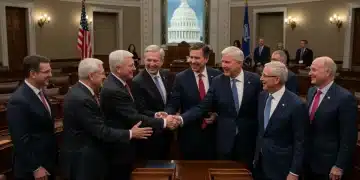Municipal bond markets see investor retreat trends

Anúncios
Municipal bond markets see investor retreat due to economic uncertainties, rising interest rates, and concerns over credit ratings, significantly impacting funding for local infrastructure and community projects.
Municipal bond markets see investor retreat lately, raising concerns among investors and officials alike. As interest rates fluctuate and economic factors evolve, what does this mean for the future of municipal bonds?
Anúncios
Recent trends in municipal bond markets
Recent trends in municipal bond markets have highlighted shifting dynamics as investors reassess their strategies. With economic uncertainties at the forefront, understanding these changes is essential for both investors and policymakers.
Key Shifts in Investor Behavior
One significant trend is the increased caution among investors. Many are focusing on the performance of credit ratings and overall market stability. As interest rates rise, fears over potential defaults have prompted investors to reevaluate their portfolios.
Anúncios
- Rising interest rates impact bond yields.
- Credit rating changes affect investment choices.
- Investor confidence fluctuates with economic indicators.
Additionally, many investors are gravitating towards bonds with emergency clauses, which offer protection in uncertain times. This focus on safety reflects a broader tendency to diversify portfolios and reduce risk.
Impact of Market Conditions
Another notable factor is the relationship between market conditions and municipal bond performance. Economic slowdowns can lead to reductions in tax revenue, impacting municipalities’ ability to pay back bonds. Therefore, investors are paying close attention to local economic health. Demand for bonds often shifts depending on local projects and infrastructure needs, affecting how municipalities issue bonds and what terms they offer.
As demand for municipal bonds remains, trends indicate a potential shift towards green bonds. Investors increasingly prioritize sustainable projects, prompting municipalities to adapt their offerings.
Factors driving investor retreat

Several factors driving investor retreat in municipal bond markets have emerged. As we dive deeper into these nuances, it’s essential to grasp how they affect investment behaviors.
Economic Uncertainty
The ongoing economic climate has created a sense of hesitation among investors. Heightened concerns over inflation and potential recession have made many rethink their positions. Investors are more selective, favoring bonds that represent lower risks.
- Rising inflation decreases bond attractiveness.
- Economic slowdowns raise concerns about repayments.
- Continued interest rate hikes impact overall market sentiment.
Market fluctuations are another layer contributing to this trend. Volatility in financial markets often leads to cautious behavior, as many investors seek stability over potential gains. With unpredictability, even seasoned investors are reframing their strategies.
Shifts in Policy and Regulation
Government policies also play a role in shaping investor confidence. Changes in regulations can impact bond performance, making certain investments less appealing. For instance, shifts in tax laws, especially those affecting municipal bonds, can lead to a reevaluation of their value.
Moreover, credit rating agencies sending mixed signals about the health of various municipalities can deter investment. As these agencies assess and adjust ratings, investors become more wary, especially if there’s news of fiscal issues or mismanagement.
Impact on local economies and infrastructure
The impact on local economies and infrastructure from changes in municipal bond markets is significant. As investment retreats, the ability of municipalities to fund essential projects is increasingly jeopardized.
Funding Shortages
Without adequate funding from municipal bonds, local governments struggle to finance critical infrastructure. This includes roads, schools, and public safety resources. When municipalities cannot raise funds, projects may stall or be canceled entirely.
- Delays in infrastructure upgrades affect daily commuting.
- Public safety services may face budget cuts.
- Economic growth could slow due to lack of investment.
Moreover, when infrastructure projects are delayed, overall community prosperity faces setback. Job creation often relies on these projects, which means fewer jobs for residents. This chain reaction can lead to reduced local business revenues.
Effects on Quality of Life
As essential services and facilities suffer, the overall quality of life for residents is compromised. Traffic congestion, deteriorating roads, and insufficient public facilities can lead to frustration among citizens. Additionally, community investments may decline, causing some areas to be less attractive for new residents and businesses.
Recovery from these impacts can be slow. Municipalities must work harder to regain investor confidence while addressing the pressing needs of their communities. Engaging with stakeholders and creating appealing project proposals can help rebuild interest.
Future outlook for municipal bonds

The future outlook for municipal bonds involves navigating a complex landscape shaped by economic conditions and investor sentiment. As markets fluctuate, predictions regarding municipal bonds are key for stakeholders.
Market Recovery and Stability
One potential development is the recovery of the municipal bond market. If economic conditions stabilize, investors may regain confidence. This could lead to increased demand for bonds, which would support local projects and infrastructure improvements.
- Interest rate stabilization can boost bond attractiveness.
- Investors might seek safer assets as inflation concerns ease.
- Municipalities could benefit from improved credit ratings with economic recovery.
Additionally, legislative changes aimed at promoting municipal financing could create a more favorable environment. Governments may look to facilitate easier access to bond markets, enhancing investment opportunities for municipalities.
Innovations and Sustainable Bonds
Another trend is growing interest in sustainable bonds. These bonds fund projects that promote environmental and social well-being. Investors increasingly prefer to support initiatives that align with their values. Municipalities that issue green bonds may attract a new wave of investors focusing on sustainability.
As the landscape evolves, changes in policies and market dynamics will also shape the future of municipal bonds. Engaging with investors and aligning offerings with market needs will be critical for organizations seeking to leverage municipal financing.
FAQ – Frequently Asked Questions about Municipal Bond Markets
What factors are influencing the current retreat of investors in municipal bonds?
Economic uncertainty, rising interest rates, and credit rating changes are key factors influencing the retreat of investors in municipal bonds.
How do municipal bonds affect local communities?
Municipal bonds provide funding for essential infrastructure projects, such as roads and schools, impacting the overall economic health and quality of life in communities.
What is the significance of sustainable bonds in the municipal bond market?
Sustainable bonds, often used to fund environmentally friendly projects, are gaining popularity as investors seek to support initiatives that align with their values.
What does the future hold for the municipal bond market?
The future may see recovery as investor confidence returns, alongside innovations like sustainable bonds and supportive legislative changes that enhance market access.





